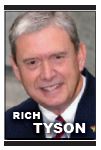Richard Tyson
On Oct. 18, we lost a great leader, a man who truly deserves the honor and distinction of being described as a statesman. Gen. Colin Luther Powell passed from mortality due to complications from COVID-19 amid an ongoing battle with blood cancer.
In eulogizing Gen. Powell, I want to focus on that descriptive term: “statesman”. Specifically, I call attention to the attitudes and behaviors that formed his statesmanship and the lessons that leaders today might gain from his life.
His statesmanship was largely based on what he called “My 13 Rules.” They are:
1. It ain’t as bad as you think. It will look better in the morning.
2. Get mad, then get over it.
3. Avoid having your ego so close to your position that when your position falls, your ego goes with it.
4. It can be done.
5. Be careful what you choose. You may get it.
6. Don’t let adverse facts stand in the way of a good decision.
7. You can’t make someone else’s choices. You shouldn’t let someone else make yours.
8. Check small things.
9. Share credit.
10. Remain calm. Be kind.
11. Have a vision. Be demanding.
12. Don’t take counsel of your fears or naysayers.
13. Perpetual optimism is a force multiplier.
His 13 rules are somewhat reminiscent of Benjamin Franklin’s 13 virtues. While they are similar in some respects, the most important similarity is the fact that both these statesmen diligently strived to live their values. They weren’t perfect in this regard, but they were consistently authentic in their efforts. Their public personas were a function of their core values. They walked their talk. While both had their detractors, they earned the respect of those from all political persuasions, even those who strongly opposed their ideas.
I mourn the loss of Colin Powell. Although he has faded from the public eye over the past few years, I long for the emergence of leaders of his stature. We are in desperate need of statesmen (and stateswomen) to lead at all levels of public and private pursuits.
Sadly, it is the absence of such statesmanship in the world today that increases our vulnerability to our societal problems. Many I talk to wish for the next Abraham Lincoln who will lead from a position of deeply seeded values, rather than self-interests that attack the very foundations of our society.
In spite of those concerns, I agree with Gen. Powell: “It ain’t as bad as you think.” But it can only look better in the morning if our leaders begin to define themselves in terms of selfless rules they will commit themselves to live by and by the virtues and values that they will not violate.
In this day and age of pandemic, racial turmoil and so many other controversial issues, most of us have gotten mad. In his writing, Colin Powell notes that that’s OK; it’s human nature to get teed off. But it’s time we got over it. It’s time we set aside our ego-driven positions and come to the table with the assurance that problems can be solved. It can be done!
This is not to say that it will be easy. We must take care to deliberate together on the issues of our times before making decisions that will be destructive to the times that lie ahead. We must not overlook the small things — the details. And we should recognize that there will always be others who see things differently. A good debate is always merited. But a good debate should lead to a good decision, even if not all points of contention are resolved.
Wouldn’t it be great if we didn’t point the finger of blame or demonize one another? Instead of the inherent negativity that characterizes so much of what we observe in today’s media-drenched environment, Colin Powell would remind us that optimism will lead us to a better place; it will multiply us as we build one another up, rather than tear one another down.
Although General Powell was well aware of the “command and control” model of leadership, he believed in setting forth a vision that his troops could believe in, one that he personally could fearlessly commit to. And in the face of adversity that he knew would surely come, he remained calm and kind.
Colin Powell was an extraordinary leader; even more, he was a statesman. I will miss him. I hope and pray that others will rise to his stature in their respective leadership roles.
Richard Tyson is the founder, principal owner and president of CEObuilder, which provides forums for consulting and coaching to executives in small businesses.








